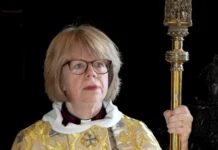Bishops are not political pundits. We are equally the pastors to Republicans, Democrats, Independents, and others. We would not presume to instruct people how to vote. Immigration policy is a worry for Americans of various perspectives, and politicians should grapple with the question. However, bishops are teachers of the faith as well shepherds of the souls of our parishioners. We speak specifically as such.
Donald Trump, our former President, has recently called immigrants ‘vermin,’ and had said that they ‘poison the blood of our country.’ A clearer example of racism, in this case with an eugenic edge, one could not find. When the parallels to Nazi rhetoric were pointed out, Trump claimed he knew no such thing. But then he repeated the very same statements, when he most certainly was aware of the parallels.
The idea of racial purity is an idol, something false and harmful to which people bind themselves. As such it presents a corrupt doctrine of the human person, since it is the human being per se who is ‘in the image of God’ (Genesis 1:26).
Here we do well to note a modern doctrinal tradition which can help to inform us. The fight against the racialist German Christians led to the insight that acquiescence amounted to allowing another leader (Fuehrer) over the Church than Christ (see The Barmen Declaration of 1934). Two generations later, the Alliance of Reformed Churches in 1982 declared at Ottawa that ‘apartheid is heresy’, for behind it is a ‘pseudo-religious ideology.’ To be sure these examples involve political movements of greater duration and articulation than we are at present dealing with. But alluding to these precedents, as we call out such a trend of thought early, is warranted. In the case of the former President’s repeated statements, the false teaching implied in his statements is the same. The ancient serpent moves through such words.
And so, in our capacity as bishops, we adjure our flocks to reject this false teaching. We exhort political leaders to speak up in its condemnation. We invite fellow Christian leaders to cleave to the Word of God and to separate themselves explicitly from such a thought. Finally, we express our hope that our nation can, at this juncture, by God’s grace, follow the ‘better angels of our nature.’
Signed,
The Rt. Rev. Cathleen Bascom, Bishop of the Episcopal Diocese of Kansas
The Rt. Rev. Larry Benfield, Bishop Resigned of the Episcopal Diocese of Arkansas
The Rt. Rev. Mark Cowell, Bishop of the Episcopal Diocese of Western Kansas
The Rt. Rev. Andy Doyle, Bishop of the Episcopal Diocese of Texas
The Rt. Rev. Jeff Fisher, Bishop Suffragan of the Episcopal Diocese of Texas
The Rt. Rev. Michael Hunn, Bishop of the Episcopal Diocese of the Rio Grande
The Rt. Rev. Fraser Lawton, Assistant Bishop of the Episcopal Diocese of Dallas
The Rt. Rev. Scott Mayer, Bishop of the Episcopal Diocese of Northwest Texas
The Rt. Rev. Jacob Owensby, Bishop of the Episcopal Diocese of Western Louisiana
The Rt. Rev. Poulson Reed, Bishop of the Episcopal Diocese of Oklahoma
The Rt. Rev. Kathryn Ryan, Bishop Suffragan of the Episcopal Diocese of Texas
The Rt. Rev. Michael Smith, Assistant Bishop of the Episcopal Diocese of Dallas
The Rt. Rev. George Sumner, Bishop of the Episcopal Diocese of Dallas




[…] Source link […]
[…] Source link […]